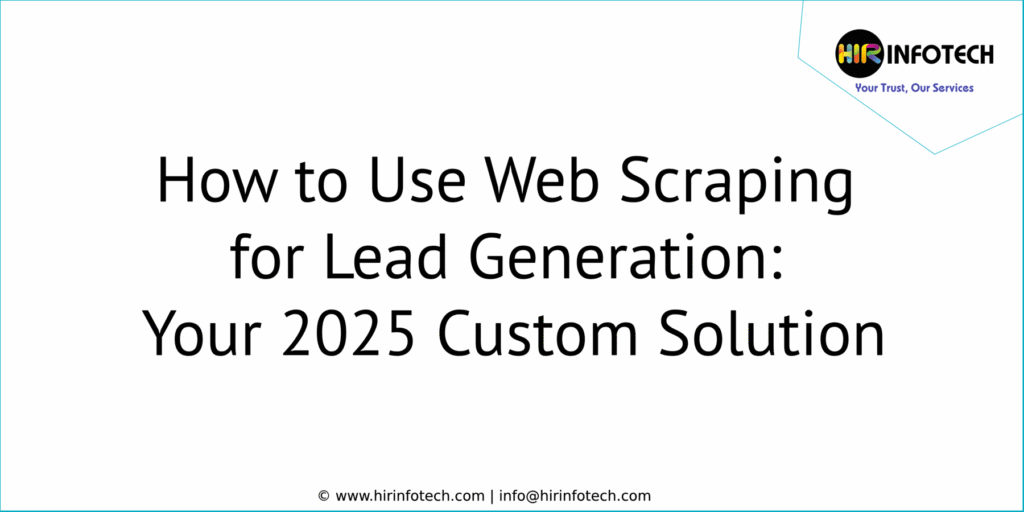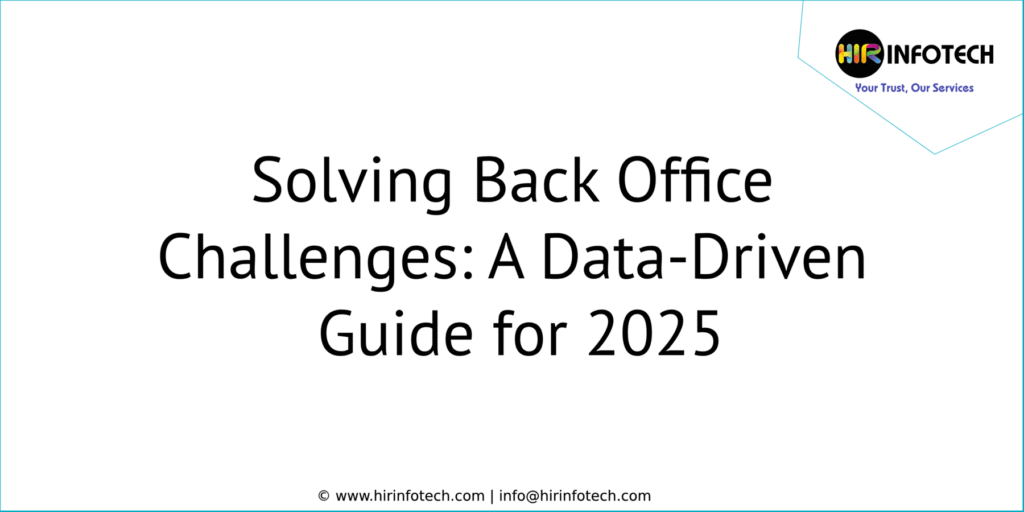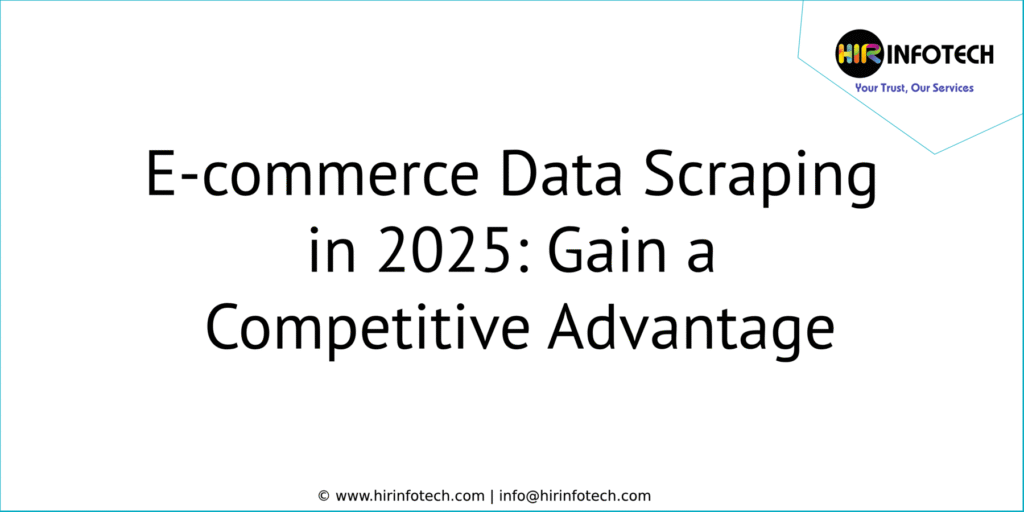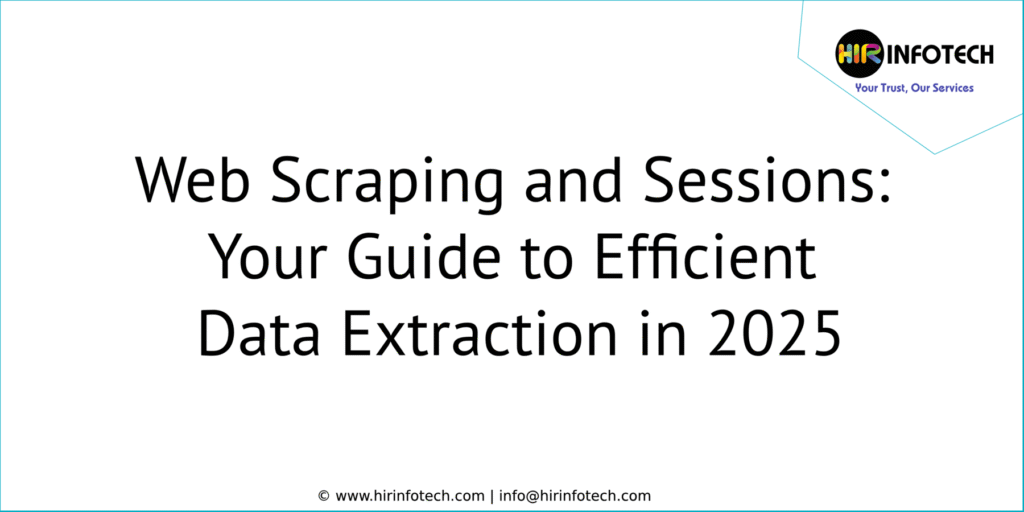
Introduction:
Every business needs customers. Finding new clients (leads) is crucial for growth. Lead generation can be time-consuming and costly. Web scraping offers a powerful solution. This guide explains how custom web scraping can supercharge your lead generation efforts in 2025.
Understanding Leads: Sales Leads vs. Business Leads
Before we dive in, let’s clarify two types of leads:
- Sales Leads: Individuals interested in buying your product or service. Think direct consumers (B2C).
- Business Leads: Companies interested in partnering with you. Think business-to-business (B2B).
Both types are valuable. Web scraping can help you find both.
What is Lead Generation Scraping? (And Why It’s a Game-Changer)
Lead generation scraping is automated data collection. It’s like having a tireless research assistant. This assistant gathers contact information from websites. It compiles this data into a usable format (like a spreadsheet). This saves you hours of manual searching.
Key Benefits of Web Scraping for Lead Generation
- Efficiency: Automate the lead-finding process. Save time and resources.
- Accuracy: Reduce human error. Get reliable, up-to-date contact information.
- Targeted Leads: Focus on specific industries, locations, or job titles.
- Scalability: Collect thousands of leads quickly. Grow your outreach efforts.
- Cost-Effectiveness: Often cheaper than buying lead lists or using manual methods.
- Competitive Advantage: Find leads your competitors might miss.
- Customization: Tailor your scraping to your exact needs. Get precisely the data you want.
- Stay updated: Always stay informed by scraping updated data.
Traditional Lead Generation vs. Web Scraping
Let’s compare traditional methods with web scraping:
| Feature | Traditional Methods | Web Scraping |
| Speed | Slow, manual process | Fast, automated process |
| Accuracy | Prone to human error | High accuracy, minimizes errors |
| Cost | Can be expensive (buying lists, staff time) | Generally more cost-effective |
| Targeting | Limited targeting options | Highly targeted (industry, location, job title, etc.) |
| Scalability | Difficult to scale | Easily scalable to collect large volumes of leads |
| Data Freshness | Data can quickly become outdated | Can provide real-time or near real-time data |
How Custom Web Scraping Works (The Process, Simplified)
Here’s how a custom web scraping service works:
- Define Your Needs: What types of leads do you need? What information is crucial (email, phone, company size, etc.)? Which websites contain this data?
- Website Analysis: Experts analyze the target websites. They identify the structure and how data is presented.
- Scraper Development: Custom code is written (usually in Python). This code is specifically designed to extract the data you need.
- Proxy Integration: Proxies (different IP addresses) are used. This helps avoid getting blocked by websites.
- Data Extraction: The scraper runs automatically. It collects the specified data from the target websites.
- Data Cleaning and Validation: The extracted data is cleaned and checked for accuracy. Duplicate entries are removed.
- Data Delivery: You receive the data in a usable format (CSV, Excel, JSON, or directly to your CRM).
- Scheduled Update: Setting frequency of data updation as per business requirement.
Why Choose a CustomWeb Scraping Service?
While “no-code” scraping tools exist, custom solutions offer significant advantages for serious lead generation:
- Complex Websites: Custom scrapers can handle complex website structures and dynamic content (content loaded with JavaScript).
- Anti-Scraping Measures: Experts can overcome anti-scraping techniques (like CAPTCHAs and IP blocking).
- Specific Data Needs: Get exactly the data you need, in the format you need it. No wasted effort on irrelevant information.
- Scalability: Custom solutions are designed to handle large volumes of data.
- Maintenance and Updates: Websites change. A custom service will update the scraper as needed.
- Data Quality: Custom solutions prioritize data accuracy and validation.
- Integration: Custom scrapers can integrate directly with your CRM or other business systems.
Examples of Lead Scraping in Different Industries
Let’s look at practical examples:
- B2B Lead Generation:
- Target Websites: LinkedIn, industry directories (e.g., Thomasnet for manufacturing), professional association websites.
- Data to Scrape: Company name, website, contact person, job title, email address, phone number, industry, company size, location.
- Example: A software company targeting marketing agencies could scrape LinkedIn for marketing directors in specific cities.
- Google Maps: It is one of the best ways to get localized leads.
- Target Websites: Google Maps.
- Data to Scrape: Company name, website, contact person, job title, email address, phone number, industry, company size, location, reviews. Google Maps Web Scraping can provide invaluable local business data.
- Example: A Restaurant owner can scrap details of nearby restaurants and target them for business.
- E-commerce Lead Generation:
- Target Websites: Competitor websites, online marketplaces (e.g., Amazon, Etsy), product review sites.
- Data to Scrape: Customer reviews (identifying pain points), product information (to find gaps in the market).
- Example: An e-commerce store selling handmade jewelry could scrape Etsy reviews to identify popular styles and customer preferences.
- Real Estate Lead Generation:
- Target Websites: Zillow, Realtor.com, Trulia, local real estate listing sites.
- Data to Scrape: Property listings (to identify potential sellers), agent contact information (for networking).
- Example: A real estate agent could scrape Zillow for “For Sale By Owner” listings in their target area.
- Finance Industry:
- Target Websites: Crunchbase, AngelList.
- Data to Scrape: Company information, including funding rounds, investors, and key personnel, can be invaluable for identifying potential clients or investment.
- Example: Scrape startup names, industry focus, funding stage, and contact details for founders or key decision-makers.
Cold Outreach Strategies Using Scraped Leads
Once you have your leads, it’s time for outreach. Here are some common methods:
- Email Marketing: Send personalized emails to your leads. Offer value and a clear call to action.
- Cold Calling: Directly call potential leads. Prepare a script and be respectful of their time.
- Social Media Outreach: Connect with leads on platforms like LinkedIn. Engage with their content and build relationships.
- Direct Mail: Send physical mail (postcards, brochures) to potential leads. This can be effective for local businesses.
- Messenger Outreach: Use messaging apps (WhatsApp, Facebook Messenger) for personalized communication. Check platform rules for business use.
Best Practices for Cold Outreach (Key to Success)
- Personalization: Don’t send generic messages. Tailor your outreach to each lead.
- Value Proposition: Clearly explain why your product or service is beneficial to the lead.
- Clear Call to Action: Tell the lead what you want them to do (visit your website, schedule a call, etc.).
- Follow Up: Don’t give up after one attempt. Follow up politely and persistently (but not aggressively).
- Track Your Results: Monitor your outreach efforts. See what’s working and what’s not.
- Compliance: Follow email marketing regulations (CAN-SPAM Act in the US, GDPR in Europe).
Legal and Ethical Considerations for Lead Scraping (Expanded)
- Data Privacy: Be aware of and comply with data privacy laws (GDPR, CCPA, etc.). These laws regulate the collection and use of personal data.
- Terms of Service: Always respect the terms of service of the websites you scrape.
- Transparency: Be transparent about your data collection practices. If possible, inform website owners that you are scraping their site (if it’s not prohibited).
- Data Security: Protect the scraped data. Use secure storage and access controls.
- Copyright Considerations: Be mindful of copyright laws when scraping content. Avoid reproducing copyrighted material without permission.
- Avoiding Overload: Implement delays and respect request limits to prevent overwhelming target websites.
Choosing a Web Scraping Service Provider (What to Look For)
- Expertise: Do they have experience scraping the types of websites you need?
- Technology: Do they use up-to-date scraping techniques and tools?
- Data Quality: Do they have processes for data cleaning and validation?
- Scalability: Can they handle your current and future data needs?
- Compliance: Do they understand and comply with data privacy laws?
- Communication: Are they responsive and easy to work with?
- Pricing: Is their pricing transparent and competitive?
- Customization: Can they tailor their services to your exact requirements?
- References/Testimonials: Check for positive reviews and case studies.
Frequently Asked Questions (FAQs)
1. Is web scraping legal?
It’s a complex issue. Scraping publicly available data is generally legal if you follow website terms of service and data privacy laws.
2. How can I avoid getting blocked while scraping?
Use proxies, rotate user agents, add delays between requests, and respect the website’s robots.txt file.
3. What’s the best programming language for web scraping?
Python is the most popular due to its excellent libraries (Beautiful Soup, Scrapy, Selenium).
4. How much does a custom web scraping service cost?
The cost varies depending on the complexity of the project, the volume of data, and the provider. Get a custom quote.
5. What’s the difference between web scraping and using an API?
APIs provide a structured way to access data. Scraping extracts data from the HTML. APIs are preferred if available.
6. How long does it take to build a custom web scraper?
The timeline varies depending on the complexity of the website and the data requirements. It can range from a few days to several weeks.
7. Can web scraping be used for both B2B and B2C lead generation?
Yes, web scraping is effective for both B2B and B2C lead generation. It can be tailored to gather relevant contact information for both types of businesses.
Ready to transform your lead generation with custom web scraping? Hir Infotech offers expert web scraping, data extraction, and data analytics services. We build tailored solutions to deliver high-quality leads directly to your CRM. Contact us today for a free consultation and let us help you grow your business!



